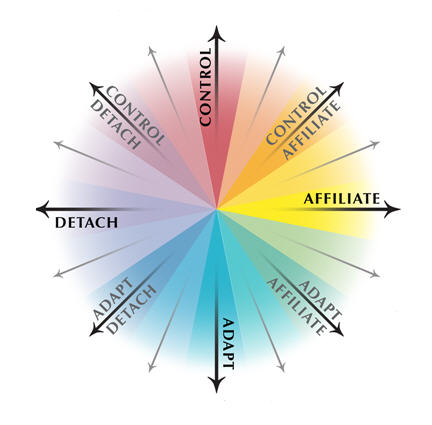|
| DISC Managing Strengths Training
Chicago Area March 11-12, 2008 |
 |
|
Register Now for this event
|
Pamela Cole
Founder of PsychTech Inc. |
 |
|
|
|
|
|
|
|
Greetings!
For the past 30 years I have been working with the DISC system of behavior in training, consulting and coaching applications. I've had the opportunity to use the DISC system with over 30,000 people in seminars and workshops in a great variety of industries, organizations and countries. I've also had the opportunity to develop several products based on the DISC system of behavior-DiSC ®PPSS, DiSC® Indra™, Role Behavior Analysis®, and DiSC® Management Strategies. As a result of my work as a DISC practitioner and my continued involvement in the research and development of the DISC system, I've had a chance to dig really deeply into the history of the DISC model of behavior and into the underlying structure of the DISC system.
Since the early 1990s when I initiated the revalidation of DiSC® Classic, I have been wrestling with questions about the underlying structure of DISC. During my 20-year literature search on the history of DISC, I discovered not only the historical roots of the DISC system but also where the DISC system fits in the field of personality and temperament. It is the confluence of these two areas of practice and research that resulted in the breakthrough idea that DISC is round. This wildly exciting "Eureka" moment occurred in the fall of 2002 while I was developing DiSC® Indra™. Since that time, I have had the opportunity to continue to develop more understanding of the application of DISC-in-the-Round which I'd like to share with you in this newsletter and in future training events. |
 |
A Simple Understanding of DISC-in-the-Round |
If you are baffled by this new way of talking about the DISC model, download these resources for "just-in-time" learning about DISC2008.
|
 Why DISC-in-the-Round is so Important Why DISC-in-the-Round is so Important
- DISC-in-the-Round is true to Aristotle's original conception of temperaments as a circular and continuous model. Also, Aristotle's circular construction is essential to understanding how we move from one state (style) to another state (style).
- Marston presented the DISC model as a circular, continuous structure where energy moved from one state to another following predictable rules which he attempted to model mathematically in his books, "Emotions of Normal People" and "Integrative Psychology".
-
The use of Cartesian coordinates to define the circumplex DISC Map allows us to use Euclidean distance measurements of closeness or distance to determine how similar or dissimilar two styles are based on their location on the DISC Map. This is something that Cattell, Clarke and Cleaver all tried to do in their assessments.
-
Sixteen styles can be easily understood from a logical progression of 4 nodal styles plus 4 combination styles plus 8 transitional styles. These styles can be described in commonly understood behavioral terms such as Control, Adapt, Affiliate, and Detach.
-
|
 |
Managing Strengths and Job Fit |
|
Just a few days left!!
Participate in our research and learn about the DISC-in-the-Round approach to Job Fit, Observed Behavior and Natural Traits/Characteristics. Prepare by for the card sort by viewing two background presentations and then complete the three different card sort exercises that build a Map of DISC role-based behavior, Natural Traits and Observable Behavior. Watch RBA Overview and Understanding DISC-in-the-Round then complete the online card sort exercises Job Fit Research, DISC Characteristics. DISC Observed Behavior. All participants in the research will receive feedback on the results at the conclusion of the project. |
 |
Correlation of DISC Style with Gallup Strengths |
| We have been gathering information on the correlation of DiSC Classical Patterns with Gallup Strengths for the past few months. Many people have submitted thier data as part of this informal study. If you have taken both assessments and would like to participate in this study, please send your data to: pamela@psychtech.com . The results will be reported back to all who participate. | |
DISC Approach to Managing Strengths workshop is scheduled in the Chicago area March 11-12, 2008.The Chicago workshop is sponsored by Mitchell Motivation.For more information, contact Lauri Mitchell at laurimitch@comcast.com.
Sincerely,
Pamela
Pamela Cole
PsychTech, Inc. | |
|
|